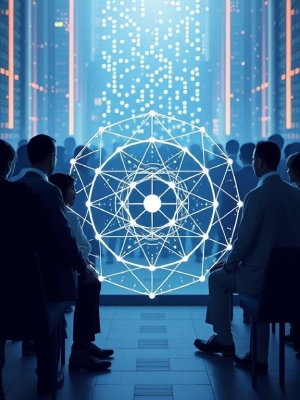DAOs Changing the Way We Build and Manage Organizations
Decentralized Autonomous Organizations, or DAOs, are another kind of organization. They turn away from CEO and managerial roles. They run mainly on code: smart contracts on a blockchain. People become members in a DAO by holding tokens that bestow upon them the right to vote on a certain decision. These decisions may be about funding a project, changing the process, or managing shared resources.
DAOs intend to make decision-making processes more equitable and open to change. With no one person overseeing the operating system, the power is dispersed within the relevant community. Everything is run through code and voted on by the community processes.
How Do DAOs Work?
The DAO is a type of organization governed by smart contract programs that live in a blockchain. They contain rules for the governance of the organization and their clauses automatically kick in upon verification that certain conditions have been met. Usually, the steps are:
- Submission of Proposal: A member submits a proposal, which can be anything from spending funds to changing the method of voting.
- Voting: Token holders vote on the proposal. Generally, the more tokens you have, the more votes you get.
- Execution: If the proposal is accepted by meeting the required number of votes, the smart contracts implement it.
All of these are publicly visible on the blockchain; therefore, anyone can look at former proposals, see how voting went, and where the funds ended up. This multiplies the transparency level widely seen as a feature separating DAOs in the traditional world of organizations.
Benefits of DAOs

One type of association is a DAO. Thus, it is considered a different way for people to organize themselves and resources online. Here are a few major benefits:
Decentralized Power
There is no central authority running the show. Decisions are either taken at the apex or by one group of people. On the contrary, every token holder gets to participate in voting. This potentially opens up domains of governance which otherwise could have been influenced by bias or corruption.
Full Transparency
The public blockchain guarantees that nothing will remain hidden. One can always watch the full history of proposals, voting, and spending. This creates trust among the members of an organization and outside of it.
Automation and Efficiency
Smart contracts take care of automated administrative activities of the DAO such as voting, disbursement of funds, and enforcement of rules. The automation cuts down on time, decreases bureaucracy level, and lessens operational costs.
Global and Open Participation
Anyone with the right token holder credential from anywhere is able to become a participant in a DAO. This inclusiveness, thereby, creates the possibility of building varied, worldwide communities working together on commonly shared objectives.
Challenges and Risks of DAOs
While DAOs give rise to great opportunities, they have to contend with considerable challenges. These challenges- being unique, arising from a new set of features in the very concept of DAOs-give rise to legal uncertainties and technical vulnerabilities. Any prospective member or one who is already a part of a DAO should have a keen knowledge of the risks.
Legal and Regulatory Uncertainty
DAOs operate in grey areas of law. Since they generally lack traditional leadership with a central point of control, it is unclear how, if at all, existing laws apply to them. This can give rise to issues of liability, taxation, enforcement of contracts, etc.
Security Vulnerabilities
Being software, smart contracts too can have bugs or vulnerabilities that can be exploited by hackers. Should there be a flaw in the contract's code, attackers may be able to either drain the funds or take over the contract with malicious intentions.
Some Issues Affecting Decision-Making Efficiency
While decentralization fosters inclusivity, it may result in sluggish decision-making. Reaching consensus among large groups of holders may be very tedious, discouraging their motivation toward voting.
Token Distribution and Governance Threats
The tokens are not always distributed evenly in every DAO. Sometimes a handful of holders might accumulate a very large proportion of tokens, thus centralizing power and undermining the aim of democracy.
Types of DAOs
Some popular DAOs are:
- The DAO: Among the very first DAOs launched in 2016, it raised millions in funding but ultimately was brought down by an infamous hack, leaving the DAO concept vulnerable to criticism over security.
- MakerDAO: A decentralized lending platform that governs its stablecoin DAI through community voting.
- Uniswap: A decentralized exchange governed by decisions of token holders where voting is conducted concerning upgrades and funding.
Conclusion
Decentralized Autonomous Organizations represent a silver lining on the horizon for transparent, democratic, and automated governance. DAOs offer decentralization, efficiency, and participation from anywhere in the world. However, it also faces a handful of significant disadvantages, particularly concerning the security fair environment, legal certainty, and fairness in the treatment of its members. If the wave of blockchain technology keeps growing, with regulations popping up and evolving around it, DAOs would slowly but surely become a familiar organizing blueprint for digital communities and businesses.
